MercoPress. South Atlantic News Agency
Tag: British Antarctic Survey (BAS)
-
Monday, April 7th 2025 - 15:54 UTC
Insights into the impact of melting mega-brergs with robotic gliders
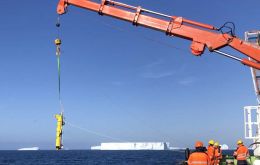
For the first time, scientists have collected measurements close to a giant iceberg, giving an unprecedented window into the impact of meltwater on the surrounding Southern Ocean and ecosystem. The paper is published in the journal Nature Geoscience.
-
Monday, March 24th 2025 - 08:58 UTC
South Georgia’s ground-fish survey reveals key insights of marine life

The waters surrounding South Georgia, nestled beneath glaciated mountains, are among the most biologically rich in the Southern Ocean. In February, a team of scientists from the British Antarctic Survey (BAS) and international institutions embarked on an important research expedition to explore the diverse marine life – including ground-fish – thriving 300 meters below the surface.
-
Tuesday, March 11th 2025 - 09:59 UTC
Falklands BFSAI stationed, support BAS in reconnaissance mission in Antarctica

The British Forces South Atlantic Islands, BFSAI continue to support the British Antarctic Survey following a reconnaissance mission over the Union Glacier, Antarctica.
-
Saturday, February 15th 2025 - 20:26 UTC
New map of South Orkney Islands published for the first time in 40 years by BAS
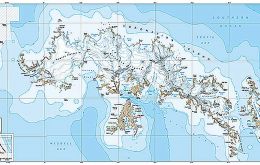
A new map of the South Orkney Islands has been released by British Antarctic Survey (BAS) – the first UK published, topographic map of the region in almost 40 years. Created by the Mapping and Geographic Information Centre at BAS, the map offers a detailed topographic view of the entire South Orkney archipelago on one side, with a focused, high-resolution map of Signy Island on the reverse.
-
Friday, February 7th 2025 - 07:59 UTC
Scientists discover micro plastics in Antarctica deep field camps
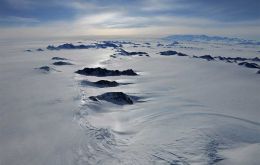
Scientists have discovered microplastics in the snow near some of Antarctica’s deep field camps, revealing how far-reaching plastic pollution has become. While not new, it’s the first time these tiny pieces of plastic have been found in remote locations.
-
Saturday, February 1st 2025 - 08:13 UTC
BAS studies whales and fish to protect South Georgia marine ecosystem
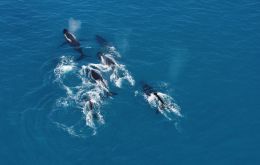
British Antarctic Survey scientists on the sub-Antarctic island of South Georgia are working to better understand the rich marine life that inhabits the region. This month teams are focusing on two major projects: one on whales and their consumption of krill (a shrimp-like creature that’s abundant in the Southern Ocean), and another on populations of bottom-dwelling fish. Their findings will help ensure the long-term health of the region’s ocean ecosystem and support sustainable fisheries.
-
Monday, January 27th 2025 - 07:58 UTC
Polar Medal 2025 for British Antarctic Survey staff

Congratulations to British Antarctic Survey (BAS) staff who have been awarded a Polar Medal in the 2025 New Year’s Honours List for their contributions to improving our understanding of Antarctica, through scientific or technical work in or about the Polar Regions.
-
Friday, January 24th 2025 - 21:10 UTC
Giant iceberg approaching South Georgia stirs fears
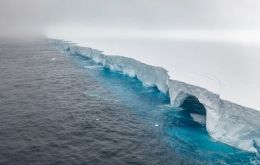
A23a, arguably the world’s largest and oldest iceberg which has been wandering through the South Atlantic and headed for the British Overseas Territory of the South Georgia Islands since last month, has been reported not to have changed course this week nor upped nor melted, thus posing a serious threat to the local fauna. Earlier this week, it was spotted 173 miles (280km) away.
-
Tuesday, December 17th 2024 - 10:07 UTC
World's largest iceberg headed for South Georgia Island

According to the British Antarctic Survey (BAS), the 3,600 square kilometer iceberg known as A23a broke off from Antarctica and was reportedly going adrift in the South Atlantic, probably towards South Georgia Island. It is arguably the world's largest and oldest iceberg, with ice sheets 400 meters thick, and weighing almost one billion tons.
-
Wednesday, November 27th 2024 - 02:40 UTC
Sunday was World Walrus Day, with some 25,000 along the Atlantic
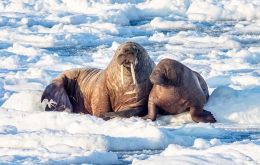
From their unmistakable tusks to their characteristic bristles (the envy of many a ‘Movember’ moustache!), the walrus is one of the Arctic’s most iconic species, and today (Sunday 24 November) is World Walrus Day!
